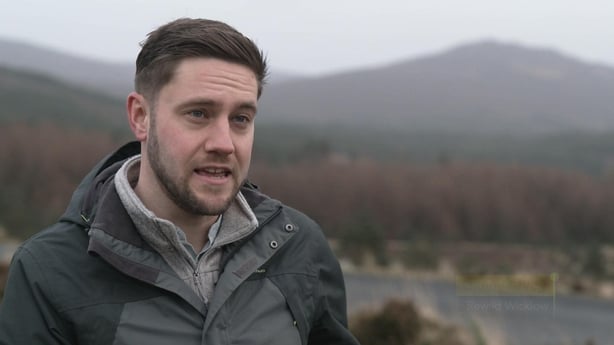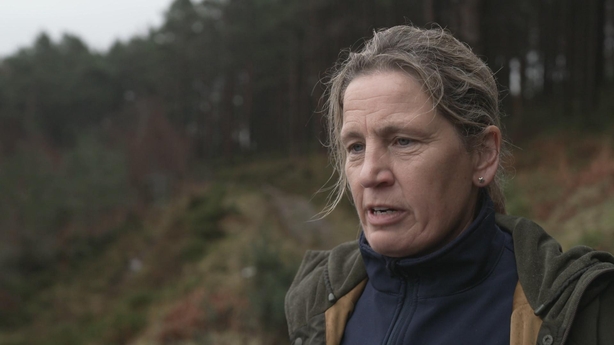With one third of our protected species and 85% of protected habitats in poor condition, the Government's National Biodiversity Action Plan, which was launched on Thursday, aims to address the decline in species loss and restore balance and variety to nature.
The Government says the plan is a new departure because it adopts a "whole of government approach," whereby each Government department’s progress on biodiversity is tracked and "expenditure allocations on measures that may adversely affect biodiversity" are reported.
Social Democrats spokesperson for Climate and Biodiversity Jennifer Whitmore has questioned the new plan’s stated aim of a "whole of government approach" though, saying it’s undermined by state bodies like Coillte and Bord na Móna having a commercial purpose which can work against biodiversity.
"We need state entities such as Coillte and Bord na Móna to be putting their efforts into biodiversity restoration as well. In order for them to do that, they need the Government to change the legislation, to look at their remit so that they're not purely commercial entities," Ms Whitmore told Miriam O’Callaghan on Prime Time on Thursday.
In response to Ms Whitmore’s comments, Minister for Heritage Malcolm Noonan said that the State has "very good collaborative partnerships with both Coillte and Bord na Móna."
Speaking on Prime Time Mr Noonan added that, "Coillte have dedicated over 30% of their estate towards nature restoration and Bord na Móna are rehabilitating 33,000 hectares of peatland as well."
Minister of State @noonan_malcolm and Social Democrats spokesperson for Climate, Environment & Biodiversity @WhitmoreJen disagree over aspects of the Government's new National Biodiversity Plan.@rtenews | #rtept pic.twitter.com/UzrFGBR5ss
— RTÉ Prime Time (@RTE_PrimeTime) January 25, 2024
In the Wicklow Mountains National Park however, the environment and wildlife campaign group ReWild Wicklow say it's a case of two state agencies working in close proximity, which don’t collaborate closely enough.
The National Parks and Wildlife Service (NPWS) are working to improve biodiversity in the national park, while Coillte, our forestry agency works towards a commercial goal of planting single species non-native trees.
"There's two arms of the State right up against each other. One of them is looking at conservation and biodiversity, and the other is looking at turning the profit out of state forestry," according to Danny Alvey, spokesperson for ReWild Wicklow and a local election candidate for Social Democrats.
"What’s happening in the Inchavore Valley in the Wicklow Mountains is a classic example of state bodies working against each other," he says.
On three sides of the valley is National Park where the NPWS is carrying out restoration projects while in the middle of valley, Coillte is planting non-native sitka spruce trees on peatlands.

Ann Fitzpatrick, District Conservation Officer in the Wicklow Mountains National Park, welcomes the new National Biodiversity Action Plan and says they have a number of native tree and peatland restoration projects which enhance biodiversity in the highlands above Inchavore Valley and Glendalough.
"Our peatlands are probably one of the richest habitats that we have in Ireland. Some people would describe them as 'mini rainforests,’" Ms Fitzpatrick told Prime Time.
But given the constant challenges, she says they are literally losing ground.
"It's fairly heartbreaking to watch these habitats go into further decline. The amount of peat that's been washed off our mountain sides is just shocking."
Other challenges faced by the NPWS include uncontrolled deer populations and increasing numbers of forest fires during our hotter summers that are laying waste to precious habitats which take decades to restore.
Given the scale of these challenges, Ann Fitzpatrick welcomes the new plan and says the most important part of it is the whole-of-government approach and "how the agencies interact and work together."

But ReWild Wicklow say the current lack of a "whole of government approach" and joined-up thinking is one the nature restoration's greatest challenges in the local area. They say it will remain a problem unless the ambition of the plan is improved.
Mr Alvey says the sitka spruce planted by Coillte are "clear-felled" or cut en-masse for commercial purposes which he says is bad for biodiversity.
"It’s all planted at the exact same time. It all grows at the same distance, so no ground flora can grow underneath," Mr Alvey said.
The Inchavore Valley and wider area is a Special Protection Area for birds and Danny Alvey says this approach does not help biodiversity.
"There's species here in the mountains that have gone extinct or at great risk of going extinct."
"On the mountains, we have red grouse, which is being protected with various different projects at the National Park. Right below that we have Coillte clear fell areas that will put that same species at risk. So, we have two things in conflict right next to one another," Mr Alvey says.
Another example of a species under threat is woodcock according to Danny.
"It's also a red listed, very rare bird up here in the mountains. It survives in native woodlands and in these areas of clear fell where a machine goes through and clear fells all the trees, that bird is not going to survive."
The new National Biodiversity Action Plan stipulates that by 2030, there should be "increased enhancement and restoration effort across the Coillte estate" as well as an increase in the proportion of the Coillte forest estate managed for nature.
In a statement to Prime Time, Coillte said that although native woodland supports greater biodiversity, their plantation forests "are also important habitats for many native species."
Coillte says its own plan is to increase the amount of its lands managed for nature to 30% by the year 2025 and to 50% over the longer term.
In addition, Minister of State Malcom Noonan said, "The National Parks & Wildlife Service are already buying considerable amounts of land every year, expanding the national parks and nature reserves across the country where they have a value for nature restoration, nature conservation."
Watch Prime Time on the RTÉ Player here.







